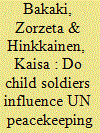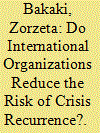|
|
|
Sort Order |
|
|
|
Items / Page
|
|
|
|
|
|
|
| Srl | Item |
| 1 |
ID:
145595


|
|
|
|
|
| Summary/Abstract |
The use of child soldiers in conflicts has received increasing academic attention in recent years. This article examines post-conflict periods to see whether the use of child soldiers mobilizes United Nations peacekeeping operations (UN PKO) in the aftermath of a conflict. Taking into consideration how child soldiers affect conflict and how important their reintegration is to sustainable peace and post-conflict development, we analyse whether the presence of child soldiers in a civil war increases the likelihood of the presence of a PKO. We argue that the UN deems a conflict with child soldiers as a difficult case for conflict resolution, necessitating a response from the international community. This is in line with our empirical results confirming that the use of child soldiers significantly increases the likelihood of peacekeeping.
|
|
|
|
|
|
|
|
|
|
|
|
|
|
|
|
| 2 |
ID:
160480


|
|
|
|
|
| Summary/Abstract |
This paper examines the effect of international organizations (IOs) on the recurrence of international crises. In line with existing literature on conflict onset, I suggest that country-dyads with more co-memberships in IOs have a lower probability of fighting again. Moving beyond this claim, however, I argue that the scope and mandate of the IO are not relevant for the risk of crisis recurrence. Ultimately, all types of IOs promote links between states and strengthen their chances for effective international cooperation. Empirically, I examine the probability of crisis recurrence between 1950 and 2008, using the count of dyadic co-memberships as the main explanatory variable. The results show that co-membership in any type of IO has negative and significant impact on crisis recurrence. Moreover, the disaggregation of IOs into different categories (e.g., those dedicated to conflict prevention, peace-brokering, or security) also points to a negative effect. The effects of IOs disaggregated by type, however, are not significantly different from the overall IO impact.
|
|
|
|
|
|
|
|
|
|
|
|
|
|
|
|
| 3 |
ID:
177839


|
|
|
|
|
| Summary/Abstract |
How does conscription influence citizens’ support for the armed forces? We argue that conscription, more so than voluntary-recruitment systems, can reach out to and socialize larger segments of the society in line with the military’s values. This, in turn, induces more positive views of the armed forces. Using a unique data set comprising information for 34 European states in 1997–2017, we find robust evidence that countries with conscription-based recruitment tend to be characterized by higher levels of support for the military. This result greatly adds to the debate about the type of military-recruitment system countries should implement: abolishing compulsory military service is usually seen as increasing efficiency and performance; yet, a positive – and previously unknown – externality of conscription that we identify is a higher degree of support by the public, which is pivotal for, inter alia, defense-policy implementation, military interventions abroad, budget considerations, or the participation in military alliances.
|
|
|
|
|
|
|
|
|
|
|
|
|
|
|
|
|
|
|
|
|